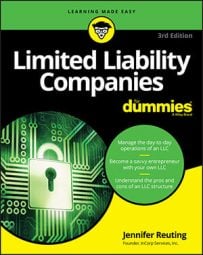Although limited liability companies (LLCs) are separate from their owners in a lot of ways, they still need to have them. An LLC without an owner is like a child without parents: It simply doesn’t exist.
So, even though you may have called up a filing company and filed your LLC with the state, until you go through the process of doling out ownership in your LLC, it doesn’t become its own legitimate entity.
The owners in an LLC are called members. They have units of ownership called membership interests that show what percentage of the company they own and how much influence they have when voting on important company matters. Membership interests in an LLC are comparable to stock in a corporation. However, unlike the S corporation, which is often compared to the LLC, an LLC can have unlimited members of any type.
Members can be citizens of other countries or even entities, such as corporations, partnerships, or trusts.
Unlike corporations, LLCs offer a lot of flexibility in how you issue membership. For instance, your LLC can have many different forms of membership, called classes. You can set whatever rules you like for each class.
If you structure them properly, classes are a great way to entice investors or partners to join your business — some folks may want a bigger piece of the profits up front, while others may want more control. For example, one class can have priority on the profit distributions, while another class is second in line. Or one class can have a say in managing the company, while another class must remain silent.
With an LLC, you can structure the membership in a way that makes everyone happy. And happy partners make for a happier you. Trust me on this.
The owners of an LLC not only own the entire business and all its assets, but also generally have the final say. Although they may not all manage the day-to-day operations of the business, they do elect the managers. They vote on important issues and ultimately control the company’s fate.
The actual term for the members of an LLC and their membership interests varies from one state to another. For example, in some states, the membership interest is called ownership interest or limited liability company interest. Just keep in mind that no matter what they’re called, the concepts are the same.
If your LLC has only one member, it’s called a single-member LLC. Unless the single member LLC elects corporate taxation, the IRS treats it as a sole proprietorship — or disregarded entity — for tax purposes.
All states now allow single-member LLCs. (It took a while for a few states to jump on the bandwagon.) However, in some states, because of certain court rulings, single-member LLCs are often disadvantageous — they aren’t afforded the benefit of partnership taxation and aren’t guaranteed charging order protection, which protects the LLC from lawsuits that may be filed against you personally.

